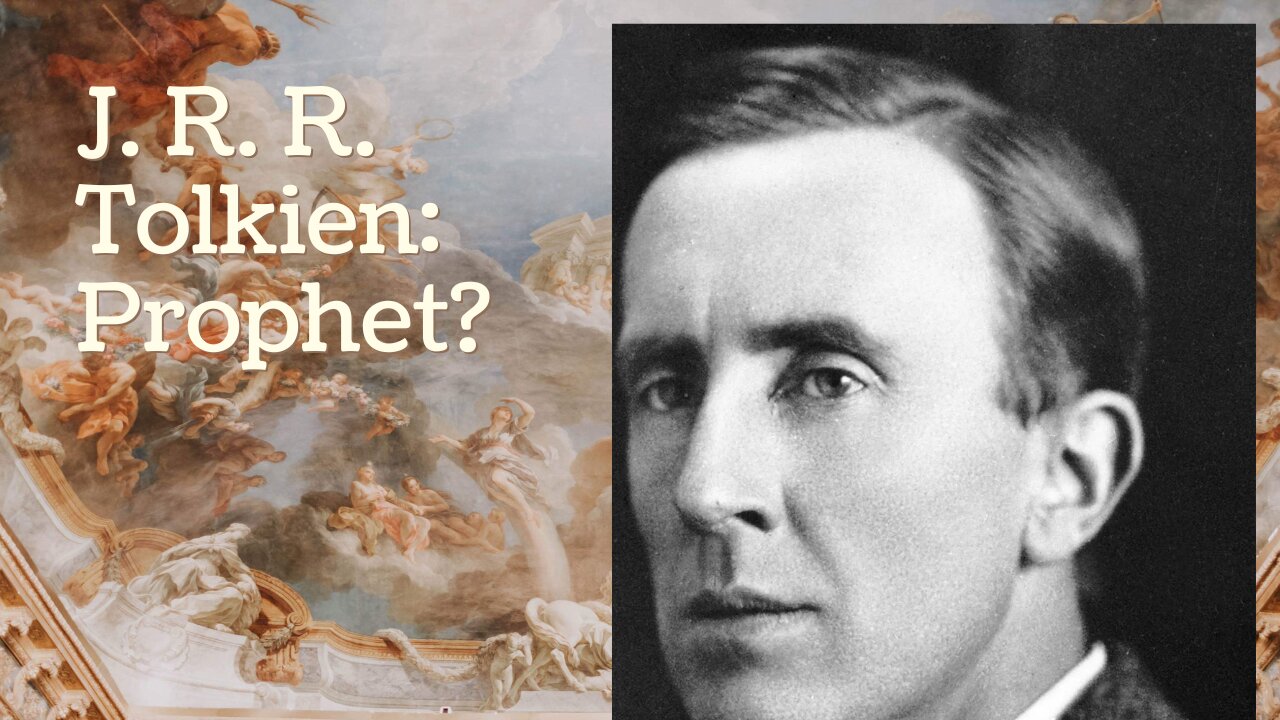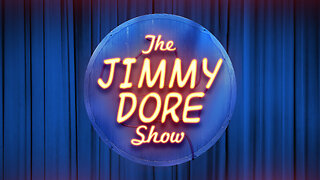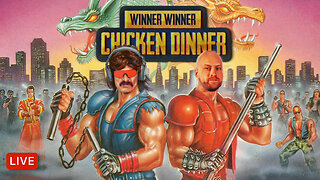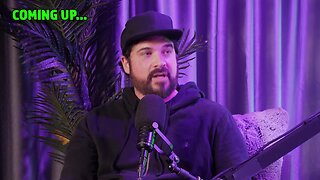Premium Only Content

Tolkien as prophet
Tolkien as prophet
By Terry A. Hurlbut
J. R. R. Tolkien, Professor of English Language and Literature at Oxford University, created the kind of mythology the English never had. The Greeks had their mythology (which the Romans copied), and the Norse peoples had theirs. (So did the Russians, but few outside of Russia know about it.) But the Angles and Saxons did not, and J. R. R. Tokien sought to fill that gap.
The wondrous tales of Middle-earth, especially The Lord of the Rings, existed only as literature while Tolkien lived. Except for three animated cartoons, no motion-picture projects came to pass until 2001. In that year, producer Peter Jackson brought Tolkien’s rich world to life and in fact made it even richer. But what no one ever considered, was that J. R. R. Tolkien was a prophet, though he never asked for that role. He has in fact anticipated both the treatment of his work in recent days, and some of the most disturbing political and social trends in Western society.
This alone makes his work worthy of review: popular culture reflects social morals, mores, and programs. If you recognize in the larger society, any evil thing Tolkien described in his work, you will know why he was a prophet.
Tolkien, Star Wars, and The Silmarillion
Tolkien actually had a larger influence than this.
• Before Peter Jackson created his celebrated trilogy,
• Before Saul Zaentz created his “serious” cartoon adaptation of the first half of the events of The Lord of the Rings, and
• In the same year that Arthur Rankin, Jr. and Jules Bass gave The Hobbit their trademark musical-comedy cartoon treatment,
The Lord of the Rings did come to film – in outer space. The name of the film project was, of course, Star Wars. Regular aficionados of these two franchises will easily recognize the analogous characters and situations in both. The analogy is not perfect (such analogies never are), but it’s close enough for purposes of this review.
Also in the same year, Christopher Tolkien (J.R.R.’s son) brought out that compendium of Tolkien’s scattered notes that set the scene for the tales he published during his lifetime. Young Christopher called this compendium The Silmarillion. No evidence survives that the elder Tolkien ever asked his son to publish this work. But The Silmarillion is the source material for all of Tolkien’s novels and short stories. It even contains a creation-of-the-world story, with which any comprehensive mythology must begin. Anyone reading The Silmarillion after reading the other novels will find in it the origins of the characters and situations, and the background for many of the reminiscences into which the characters often fall. Such a rich background enabled Tolkien to develop his characters as nothing else could have.
A mythology deriving from the Bible
From The Silmarillion especially, one can readily see that Tolkien, a devout Christian, created a mythology more like the Bible story than any other Western mythological structure. It has one true God (Eru, Iluvatar) who created other powers to serve him. One of these, Melkor, he invested with more power than the rest. But “power corrupts,” as Lord Acton said – and as Tolkien understood. Like Lucifer, Melkor aimed at the Divine Throne and became instead the enemy of Iluvatar and all his works. Also like Lucifer, Melkor could never create; he could only distort. This also applied to his lieutenant and understudy, Sauron. These two could lie without shame, and charm almost anyone. Like Satan, they leverage greed, power hunger, and other lusts.
The only sort of person Tolkien did not create, was a Redeemer. (His good friend C. S. Lewis created such a person in his own mythological parallel world of Narnia.)
At first, the American motion-picture and television industries treated The Hobbit and The Lord of the Rings at least passably. Rankin and Bass achieved complete faithfulness, because Tolkien wrote The Hobbit for eight-year-old boys. Rankin and Bass simply gave their special the same tone Tolkien uses in his original novel. The Lord of the Rings was clearly different in tone. It consists of three novels, which Tolkien wrote for adolescent boys. Saul Zaentz’ project took the same tone. So did George Lucas, when he created Star Wars, using many of the same story elements (but not all).
A change of tone
Peter Jackson, beginning in 2001, changed the tone. He created movies for adults. Not that he appealed to any prurient interest, but that he told the stories on an adult level. In boys’ stories, the adult men whom the main characters meet along the way are already sure of themselves. Not so at the adult level, when every potential ally has certain “issues” with which they must deal. Which is why, for example, the future King Aragorn does not appear to Frodo and company with all his self-doubts fully resolved, and ready to take command and lead Frodo to safety. Aragorn must grow into his role and resolve his doubts when the crisis comes to him. This is how real leaders must lead, for a crisis catches every leader unprepared to one degree or another.
One can forgive Peter Jackson for changing the tone. He made Aragorn, the other Fellows of the Ring, and other characters they meet along the way, more believable. More to the point, Peter Jackson never changed the essentials of the world Tolkien created – nor of human nature. The only objectionable change Jackson made – and probably because he had to save time – was to cut out the mini-war that Frodo, Samwise, Peregrin and Meriadoc must fight as they return home and find it overrun by gangsters answering to a bad wizard.
They’re ruining Tolkien – and proving his point
But one cannot forgive the latest treatment Amazon Prime Productions gave to The Silmarillion. By all accounts, their streaming series, The Rings of Power, tells a version of events of the Second and Third Ages of Middle-earth that one simply will not recognize in the book. Characters pursuing the cause of justice, especially male characters, act uncharacteristically stupidly. Part of this is bad writing, but the other part is an attempt to change human nature. Like Kathleen Kennedy at Lucasfilm, the producers of The Rings of Power attempt to show that men are worse than superfluous, and women must rule.
But this illustrates a profound thread Tolkien wove throughout his work during his lifetime and stated explicitly in The Silmarillion. Evil cannot create; it can only distort. That applies equally to the evil powers Tolkien created, and to how Amazon is now treating his work.
Of Orcs and Amazons
Melkor produces the Orcs, the goblin-like infantry and labor force that serves him and later Sauron, by kidnapping some of the earliest Elves and subjecting them to “slow arts of cruelty.” (Exactly what that entails, Tolkien never explained.) In a later age, wicked wizard Saruman “blend[s] the races of Orcs and men.” If Tolkien knew of Nazi experiments in blending the species of Gorilla gorilla and Homo sapiens, he never said. But did Tolkien anticipate the program to achieve sexual interchangeability through psychological, hormonal, and surgical manipulation? Again, he never said – but the Orc breeding program sounds a lot like it.
Likewise, Kathleen Kennedy, and her Rings of Power counterparts, cannot create on their own. They can only distort what others have created, to produce their own twisted vision of male-female relations. At least the Greeks were more honest; they conceived of the Amazons, a warrior culture with women in charge. These modern-day Amazons project worlds in which men make nothing but mistakes, and women make none. True enough, Tolkien did write a scene in which a “passing woman” kills an enemy commander in a duel. But that is a clear exception, which he treats as such. In the new “Force is Female” worlds of “Disney Star Wars” and “Amazon Middle-earth,” such things are the norm. (Jeff Bezos named his company for the Amazon River. But his newest hires seem to have decided, with his consent or even connivance, to make “Amazon” mean the fabled women warriors culture.)
A new kind of Orc?
But there’s more. The Rings of Power have their own analogues, in technological advances that perhaps humans should not pursue. More than a century before Tolkien, Mary Shelley (Frankenstein) sounded the same warning. The medical profession, and other professions, heap scorn on those warnings. They begin with efforts to enable the blind to see, the deaf to hear, the lame to walk, etc. Or so they say. But they are now trying to improve on the human form in ways neither Shelley nor Tolkien imagined. Except that these would not be improvements at all, but a new kind of slave chain. (That is, when they’re not practicing thoroughly bad medicine.)
So in many ways, J. R. R. Tolkien was a prophet, as Mary Shelley was. We should heed their warnings.
Link to:
The article:
https://cnav.news/2022/10/17/news/entertainment/tolkien-prophet/
Conservative News and Views:
https://cnav.news/
The CNAV Store:
https://cnav.store/
Our Silver Lines
https://oursilverlines.com/
-
 22:40
22:40
Declarations of Truth
22 days agoTariffs, trade, and taxes
862 -
 LIVE
LIVE
The Jimmy Dore Show
1 hour agoLiz Warren CAN’T DEFEND Lying About Biden! Trump Tells Putin to STOP bombing Ukraine! w/Neil Oliver
10,960 watching -
 LIVE
LIVE
vivafrei
3 hours agoSantos Sentenced to 87 MONTHS! Corrupt Judges ARRESTED! Some Canada Stuff & MORE!
14,634 watching -
 LIVE
LIVE
Nerdrotic
2 hours agoStar Wars GRAPED? Hollywood In Freefall, Silver Surfer is a MAN! | Friday Night Tights 351
3,897 watching -
 LIVE
LIVE
Dr Disrespect
6 hours ago🔴LIVE - DR DISRESPECT - PUBG - 5 CHICKEN DINNERS CHALLENGE
9,227 watching -
 1:36:46
1:36:46
RiftTV/Slightly Offensive
2 hours ago $2.95 earnedTrump SHUTS DOWN War with Iran! Bibi IN RAGE | Guest: Joel Webbon | The Rift Report
11.9K4 -
 LIVE
LIVE
Jamie Kennedy
18 hours agoThe Illusion of Time, Portals, and Paranormal Activity | Ep 203 with Jay Wasley of Ghost Adventures
129 watching -
 14:34
14:34
Bearing
9 hours agoUK Transgender Protesters are NUTS 🦄⚧🏳️⚧️
1.86K27 -
 1:41:53
1:41:53
The Quartering
4 hours agoWoke Judges ARRESTED, Rachel Zegler FAILS, McDonalds & Cancer & More
118K66 -
 2:56:07
2:56:07
The Dana Show with Dana Loesch
5 hours agoSEC DEF HEGSETH'S NEW SIGNAL CHAT CONTROVERSY | The Dana Show LIVE on Rumble!
21.3K1